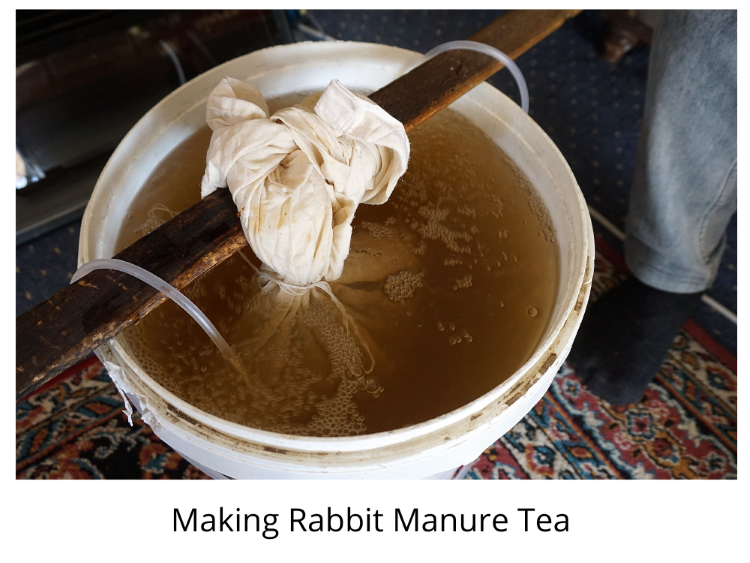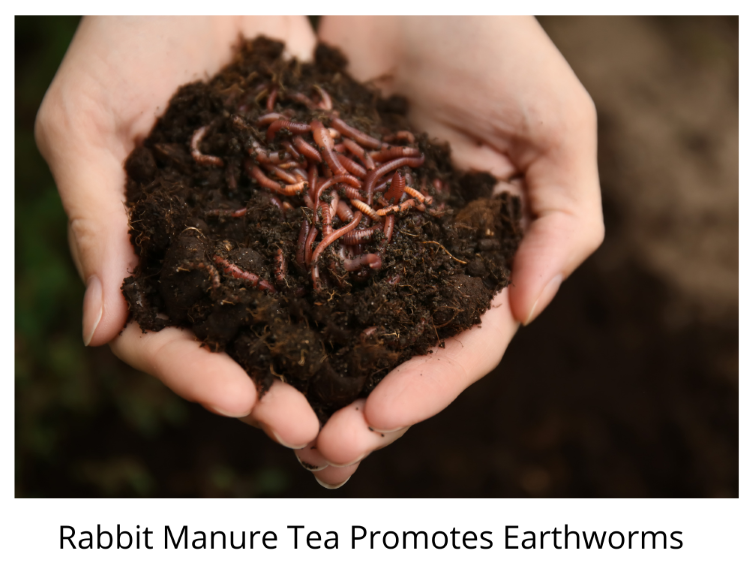Making your own fertilizer from resources readily available on your homestead is a win. When we find simple ways to stack or leverage the relationships between hobby farm animals and plants in a simple, natural, beneficial way, it feels good and we want to share it.
This article is about the simple and natural benefits of Rabbit Manure Tea.
We view the use of rabbit manure tea as a beautiful Tri-fecta of benefits in that Rabbit poop tea allows you to:
- 1) Provide immediate nutrients and micronutrients to your plants,
- 2) Reduce your use of industrial chemicals and fertilizers, and
- 3) Save your money as you care for and enjoy your homestead.
How To Make Rabbit Manure Tea
To make rabbit manure tea, also known as “bunny brew” the ratio of rabbit manure to water is 1 to 5.
That’s right, simply place a heaping shovel full of rabbit manure into a 5 gallon bucket and fill the bucket with water. We’re keeping it simple, that’s approximately a 1 to 5 ratio.
Stir the contents once or twice a day, while the mixture stews for 5 to 7 days. In the sun is preferable but not a requirement. Stirring a bit and allowing the mixture to stew for 5 to 7 days allows many nutrients and micronutrients to leave the rabbit pellets and be suspended in the water or tea.
After 5 to 7 days, strain the mixture. One way to strain out the remaining solids is to place a piece of burlap over top of another 5 gallon bucket and slowly pour the mixture through the burlap and into the second 5 gallon bucket. As a result, you have about 5 gallons of compost tea in the second bucket and some lovely solids in the burlap.
The dark tea you’ve created does not smell like manure but is rich in nutrients to help your gardens, orchards and pastures thrive.
Note that the solids in the burlap still retain a host of beneficial nutrients. Adding the solids to your gardens, orchards, pastures or compost pile adds wonderful organic matter, increasing tilth and promoting microorganism health.

More Ways To Make Rabbit Poop Tea
Another way to strain the solids from the rabbit manure tea is to simply use a colander over top of the second bucket. Pouring the mixture through the colander and into the second bucket will strain out the solids.
Lastly, a third alternative is to begin by dumping the shovel full of rabbit manure in a burlap bag, placing the bag in the 5 gallon bucket and then filling the bucket with water will also work nicely. Again stir or agitate the bag about once a day while the mixture stews for 5 to 7 days. To strain, just lift the burlap bag and let it drip over the bucket for a while.
How To Use Rabbit Poop Tea In The Garden And The Pasture
Rabbit manure tea should typically be diluted – pour about 1 cup of the tea into a gallon of water.
A pint or two of the diluted rabbit manure tea can be poured into a water can and applied directly to the ground around each plant.
Alternatively, you may put the diluted tea in a sprayer and feed pasture areas by spraying the tea. This type of foliar application is safe for animal feed crops in pasture or garden. For instance, you may be growing a patch of beets or mangel for your livestock. Foliar spraying of this crop is perfectly fine.
Benefits of Rabbit Manure Tea
Cold Manure – Rabbit manure tea and rabbit manure are not a hot manure like horse and most other manures. The nitrogen in rabbit manure is slow release so it does not burn your plants.
Great Source of Primary Nutrients NPK – Plants need nitrogen, Phosphorus and Potassium in larger amounts than other nutrients. Rabbit manure and rabbit manure tea are excellent, natural sources of these primary plant nutrients.
Fewer Pathogens – Rabbit Manure Tea and Rabbit manure have fewer pathogen problems than manure from factory feed-lot animals.
Less Smell – Rabbit Manure Tea and Rabbit Manure fertilizer are far less smelly than most manures.
Low Cost – The rabbit manure fertilizer and rabbit manure tea are low cost, high output benefits for your gardens and pastures.
Readily Available – If you or a friend have rabbits, then the rabbit poop fertilizer is easy to find.
Known Source & Low Industrial – You know what is in the rabbit poop if it is from your rabbits.
Proven to help grow healthier and more productive plants – vegetables, fruits, and meadows all benefit from rabbit poop tea.
Food for Microorganisms – Facilitates the health and growth of beneficial microorganism in the soil.
Food for Worms; Encouraging Worms – Worms benefit from the nutrients that rabbit manure tea provides to the soil. Your garden benefits tremendously from worm castings.
Micronutrients – In addition to the great NPK content, rabbit manure tea adds micronutrients such as calcium, zinc, magnesium, sulfur, boron, cobalt, copper, and more, to improve your soil.

How Is Using Rabbit Manure Tea Different From Using Rabbit Manure or Rabbit Poop Compost
Manure Tea provides for an immediate release of nutrients to your plants. It is not a prolonged time-release of nutrients. Using Rabbit poop or compost as a top dressing or working it into your soil with a broadfork is a better application if you are wishing for a steady source of nutrient release over time.
For example, if your plants are lookng sickly and need a boost, then foliar spraying of rabbit manure tea, or application at the roots, provides an immediate boost of nutrients for those plants.
Secondly, rabbit poop tea does not deliver much organic material to the soil, it is not a soil amendment, it does not build the amount of organic matter in the soil. Again, to amend the soil and build organic matter content, you may consider top dressing with rabbit poop or rabbit poop compost.
Lastly, please note that rabbit manure tea and rabbit manure fertilizer may be used together. You may use the rabbit poop tea as an instant foliar spray or at the roots while also top dressing rabbit manure as both a soil amendment, adding fantastic organic matter to the soil, and as a slow release, organic fertilizer.
Mother Earth News also points out that we should be aware of the source of our rabbit manure. If you’re getting your rabbit manure from a commercial rabbit operation, then there may be traces of chemicals and “medicines” in the rabbit manure. On the other hand, if you’re using rabbit poop from your own hobby farm, then you know what’s in that rabbit poop!
Minimizing industrial chemical exposure is a key goal for many of us.
Frequently Asked Questions Related To Rabbit Fertilizer Tea
Is Rabbit Manure A Good Fertilizer?
Yes, rabbit manure is an excellent fertilizer for plants and pastures. This article goes into depth on the hows and whys of Rabbit Manure for Fertilizer.
Is Rabbit Urine Useful On The Hobby Farm?
Yes, diluted rabbit urine can be used as both a fertilizer (high in NPK) or as a bug and pest repellent. Here is an article that covers the details on How to use Rabbit Urine.
Can we make rabbit poop compost?
Yes, rabbit poop is a great additive to your compost pile. Composting rabbit poop or use in your hobby farm gardens and pastures is one of the best ways to “stack” and leverage the benefits of raising both plants and animals in a sustainable manner.
Mixed with grass cuttings, most kitchen scraps, coffee grounds and even wood chips, rabbit poop makes for great compost. Here’s a great video from Whispering Willow Farm about making rabbit poop compost.
Is Manure Tea Safe For Vegetables?
Yes, manure tea is safe for vegetables. You can apply rabbit manure tea weekly throughout the growing season and it will help your plants thrive.
Final Thoughts on Rabbit Manure Tea
In Summary the process for making Rabbit Manure Tea is:
- Gather Rabbit Manure
- Place Shovel Full of Rabbit Manure in 5 Gallon Bucket
- Fill Bucket With Water (1 to 5 is the Ratio)
- Let Brew for 5 to 7 Days; Stir Daily
- Strain and Dilute
- The Process for Using the Rabbit Manure Tea is:
- Apply diluted rabbit manure tea to ground/roots – 1 or 2 pints per plant.
- Spray the diluted rabbit manure tea from a sprayer – works well for small pasture areas.
- Spray the diluted rabbit manure tea on your compost pile.
- Manure Tea isn’t just for vegetable gardens, it is beneficial for flower gardens as well.

